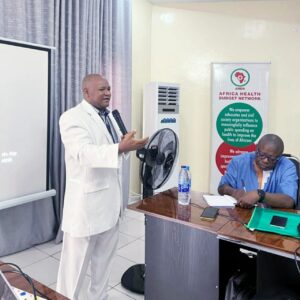African Health Budget Network (AHBN), has introduced a Health Security Accountability Framework and Scorecard to improve preparedness and transparency amidst COVID-19 and ongoing crises like cholera, Mpox, and Lassa fever.
The organization said that In the wake of these health crises, there is an urgent need to enhance transparency and readiness across the continent.

Coordinator, AHBN, Dr Aminu Magashi, said this at the end of a three-day technical peer review retreat on strengthening accountability of health security finances in Nigeria, Cameroon, and Senegal, on Saturday in Abuja.
Magashi said that the framework, which was designed to track progress on health security efforts, would help governments, development partners and civil society Organizations (CSOs) better monitor financial and non-financial commitments.
He said that by fostering greater accountability, the scorecard aimed to ensure that health security was prioritized at both national and regional levels.
“The COVID-19 pandemic exposed significant weaknesses in Africa’s health security, with many countries relying heavily on international donors to respond to the crisis,” he said.
According to him, lack of preparedness and poor coordination across African nations resulted in severe delays in detecting and responding to the pandemic.
He said that this new accountability framework seeks to address those gaps, urging African countries to invest more in Prevention, Preparedness, Response and Recovery (PPRR).
“The framework underscores the need for local production of vaccines, improved infection prevention control (IPC) measures and bolstering research in Antimicrobial Resistance (AMR),” he said.
Programme Manager of Health Reform Foundation of Nigeria, Dr Opeyemi Adeosun, said that one of the key challenges highlighted by the framework was the inadequate budget allocation to health security.
“An analysis by the Legislative Initiative for Sustainable Development (LISDEL) found that many countries, including Nigeria, allocated little or no funding to health security efforts in their national budgets.
“The AHBN’s new scorecard aims to reverse this trend by encouraging increased budgetary commitments and prudent spending,” he said.
In addition, he said that the framework advocates for greater involvement of CSOs in health security planning and implementation.
“CSOs play a vital role in community outreach and advocacy, yet they are often excluded from crucial decision-making processes, including the Joint External Evaluation (JEE), a WHO tool used to assess national health security capacities.
“Civil society organizations are closer to the grassroots and can help ensure accountability, particularly in underserved communities where government oversight may be limited.
“Their involvement is critical to the success of this framework,” he said.
He said that the Health Security Scorecard would provide a transparent way to measure progress on key indicators such as financing, governance, vaccine production, and biosafety.
“It will also track the relationship between public health authorities and security forces, ensuring a coordinated approach to tackling health emergencies.
“The scorecard will be updated quarterly, with data presented to key stakeholders, including government agencies, legislative bodies, and the media.
“This approach is expected to promote collaboration and ensure that commitments made by governments and development partners are honoured,” he said.
Hon. Mohammed Usman, Founder of the Lafiya Wealth Initiative, said that the Africa CDC has been instrumental in strengthening the capacity of African nations to respond to health crises.
“Through the creation of Technical Working Groups (TWGs), the CDC has enhanced the ability of public health institutions to act quickly in the face of disease outbreaks.
“However, the AHBN framework calls for greater participation of CSOs in these groups to ensure that all stakeholders have a voice in shaping health security policies,” he stressed.
As African countries continue to face threats from diseases like Ebola, cholera, and Mpox, Executive Director
Actions for Development and Empowerment, Cameroon, Ms Ndi Nancy Saiboh, agreed that a robust accountability system was essential to preventing future pandemics.
“It’s not just about responding to crises when they happen; it’s about being prepared and having a transparent system in place to track progress,” Saiboh said.
She said that the introduction of the African Regional Accountability Framework and Scorecard marks a significant step toward building stronger, more resilient health systems across the continent.
She said that with greater collaboration between governments, CSOs, the media and international partners, African nations can improve their preparedness for future health emergencies while ensuring that health security remains a top priority.